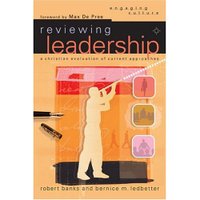It seems despite voices of woe in the industry the number of books put out by publishers, in any number of fields, will not be abetting anytime soon. Whether or not that is a good thing may be a matter of debate. Some subjects are worth discussing at length, because, trawling for deeper meanings or drawing out the nuances of the matter, yield more insight and expand our understanding with each new layer of data—whether by contrasting it against the hard edge of another discipline or by the overlay of the veneer of a new metaphor. But some subjects, once having been examined, leave one with the impression that “everything that needs to be said has been said.â€

Robert Banks and Bernice M. Ledbetter think that the subject of leadership is one of those topics worth revisiting, and they do so in their book, Reviewing Leadership: A Christian Evaluation of Current Approaches (Grand Rapids, MI: Baker Academic, 2004. 171 pp. $17.99. ISBN 0-8010-2690-3) much to our benefit. In this short book, Banks and Ledbetter do two things. First, they briefly introduce the reader to “everything that needs to be said that has been said†about leadership by providing a brief overview of how leadership has been treated and understood in what they categorize as biblical, historical, and contemporary perspectives (chapter two). Second, in the chapters following, they attempt to bring an ethical lens to the subject of leadership through a Christian perspective, beginning with “spiritual and religious dimensions†(chapter three) to a more overt Christian understanding of the leadership function in the final chapter through the use of “exemplary case studies†of Christian leadership in action (refreshingly, and tellingly, none of the persons featured in the case studies would likely be the first, or second, guess of most contemporary leaders or informed laity as to “models of leadership.â€).
According to the writers, the book is “a summary of academic approaches and concrete experiences. It is a fruit of biblical investigation and reflection on our own experiences. It is an exercise in cultural analysis and theological exploration. It is derived from current writings on leadership and personal observations of exemplary role models. It has its basis in common sense and familiar proverbs and our exposure to film and poetry†(p. 11). And it is this confessed subjectivity that yields some of the (few) least helpful portions and conclusion in the book. The critical reader, however, will be able to overcome those sections and focus on some of the more substantive and insightful contributions the authors make in this study.
The first two chapters provide a background to the study on leadership that the authors develop. The first chapter provides definitions and discussions on the nature of leadership and stakes a claim as to the importance of its study. In the second chapter the authors offer a brief historical interpretive overview of leadership, limiting the scope to a biblical context and to the last century. The brevity of the coverage leaves curious gaps in the scope of leadership studies, as well as an absence of mention of some arguably influential leadership theories and schools.
Chapters three and four provide the unique contribution that the book makes to the subject at hand. In these chapters the authors attempt to highlight overt spiritual, theological, and religious dimensions of leadership. The treatment culminates in their attempt to frame, and critique, distinctly “Christian†approaches to leadership. The fifth chapter discusses how to translate theories of leadership into practice through the advocacy of three ethical (Christian) dimensions: faithfulness, integrity, and a servant-like attitude. Following the chapter on case studies of model leaders (Franck Buchman, Soren Kierkegaard, Janet Hagberg, and Gordon Cosby), the book concludes with a a very brief chapter reflecting on how to nurture the kind of Christian leadership the authors advocate.
While not containing everything that needs to be said on the subject of leadership, this book is a good companion addition to other solid, more thorough, books on leadership that may be on the readers’ bookshelf.

